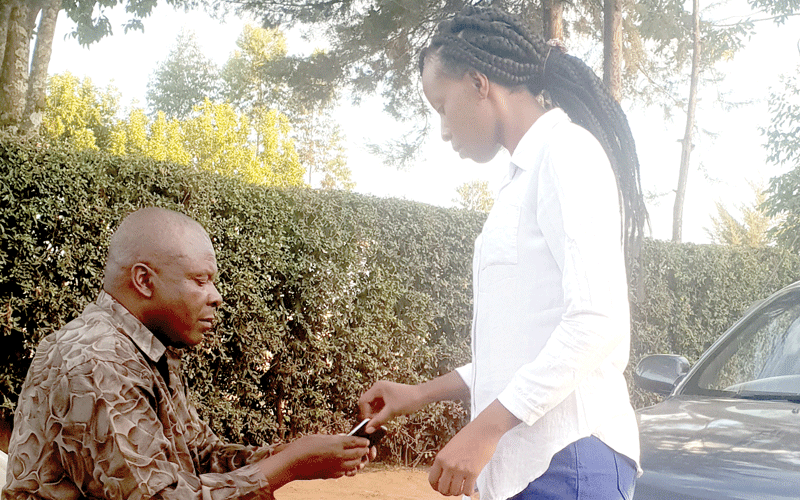The generation that technology forgot

After retiring from the banking sector 15 years ago, 67-year-old Rosemary Wangari has been living alone at her home near Kikuyu town.
Her two children visit her often, but their communication is mostly through the mobile phone.
Despite using a phone for close to 20 years, she often feels ‘lost’ in a wired-up society. She struggles to understand terms such as ‘downloading’, ‘formatting’, ‘reboot’ and has not heard of Instagram or Twitter.
She has a Facebook and WhatsApp account because everyone is on it, her children wanted her to ‘upgrade’ and she got curious to see what the fuss was all about.
However, she hardly logs on, and is clueless about how to change her profile picture.
From time to time, she enjoys funny stories and pictures sent to her via WhatsApp, but only until she mistakenly deleted the app and had to wait for her children to reinstall it for her. However, she frets over how to post comments and join in conversations online.
Inaccessible services
Wangari has two phones. One is her favourite, a basic phone with dial pads that she has been using for 10 years and the other, a Samsung Galaxy, a gift form her eldest daughter, which she finds complicated.
She is bemused about why youngsters want to be always on the go, and need instant gratification. She says people, especially older persons are lonelier and younger generation are becoming lazier with technology.
“It’s good that everything is so efficient and fast, but it is killing friendships, lovely time with family. Why can’t people just slow down?” she laments.
A police officer, Mark Masinde, 63 shares such sentiments. He finds himself living in a world where the younger generation is over-reliant on smart devices to the point of obsession.
“So much of their time is spent on smartphones. If one day they lose it, everything goes haywire, and their life literally stops as if they have lost a loved one,” he chuckles.
The world is going through a digital revolution driven by the proliferation of smartphones. These days there is a mobile application for almost everything— a taxi can be booked online, food, shop, track blood levels, order a plumber, you name it.
But as the society surges ahead, there is a segment of the population in which Masinde and Wangari belong to that is still dragging behind, grappling with the ever widening digital divide.
With services found online including government ones such as the Older Persons Cash Transfer Programme, which enables senior citizens to receive cash through their mobile phones, social enhanced healthcare and mobility for this group, there is concern that in the rush towards technology, greater reach and higher productivity, services provided by companies and the government do not end up elbowing out the elderly, leaving them unable to access the services.
As it is, many seniors have to rely on others, including their children, relatives and caregivers or more tech-savvy peers, to navigate the increasingly digitised environment.
Sociologist Albert Marango says the divide boils down to low or lack of literacy among some of the older folks.
Compared to the young, they are more likely to be daunted by a steep learning curve, and fear of making mistakes.
He cautions that the digital divide could contribute to a growing sense of alienation and helplessness for some elderly.
According to a recent survey by the US Pew Internet research centre, 77 per cent of older people would need someone to help walk them through the process of setting up a new device. Yet it is easy to assume older people will find a gadget as simple to use as everyone does.
Obstacles all the way
Computer scientists say the response time for icons on an Apple screen is 0.7 seconds, but people who are over 65 have a response time of about one second.
“Using touchscreens may come naturally to a two year old. For an older person, the nerves in the finger become less sensitive with age, meaning older people may ‘touch’ far more heavily,” says Philip Mugo, a computer science graduate.
And tests suggest that if an older person has a slight tremor, it can be registered on a device as a swipe rather than a touch. “It is these subtle issues that erode confidence and cause confusion,” says Marango.
Marango says technology developers and the elderly alike often consider the Internet as a way of ‘keeping up’ with the 21st century or a way of moving with the times for fear of being left behind.
“With this approach, it’s no wonder many people over a certain age feel reluctant to learn, whether that’s because of apathy or because of fear.
Keeping up with the youngsters’ isn’t working as a persuasive incentive to get older people online,” he says.
However, there are older people who have moved with the times. Talk of business mogul Chris Kirubi.
The 78-year-old who is active on social media describes and himself as a trailblazer who thrives on and embraces change fast.
He often offers advice on business matters engaging his followers under a hashtag #AskKirubi. Others include politicians Raila Odinga (74) who engages people on political agenda.
Internationally, we have US president Donald Trump (73) who is active on social media.
Still, many of these prominent people have a digital or communication team who manage their account or help them navigate the tech world with ease.
“There are some tech-savvy older people around, but there is clearly a large cohort of people who feel excluded by technology. They find it a bit impenetrable,” Mugo says.
Mugo says the virtual world could be the solution to many problems including mobility issues, which is a major struggle for older persons.
For example, keeping in touch with family and friends across the globe has never been easier. Revisiting the past with all your photos at your fingertips and ordering food delivery are only a few clicks away.
“Apps to jog our memory and record our diets and fitness serve an even more necessary purpose for someone in their older years,” he explains.












